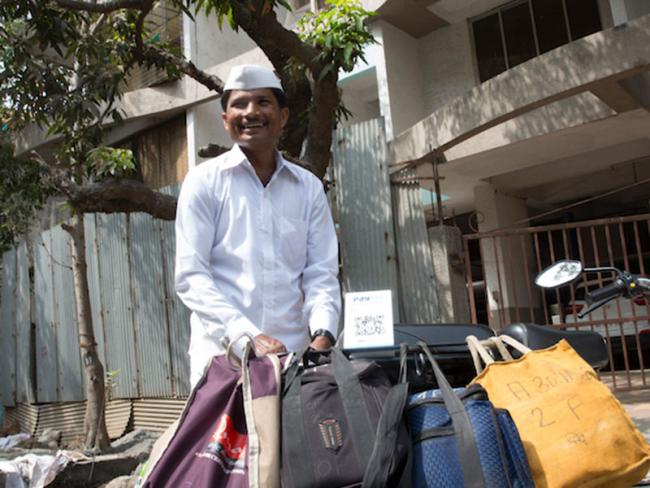
Vilash and other dabbawalas can now collect instant digital payments for delivering hundreds of thousands of home-cooked lunches every day. Photo credit: UNSGSA/Ruhani Kaur
Everyone’s talking about the India Stack these days, but what does it mean for real lives of people like Vilash, one of Mumbai’s famed dabbawala lunch deliverymen?
The Stack is a powerful and inspiring example of a digital public good and is largely responsible for India’s dramatic recent progress on financial access. It provides a complex technical infrastructure, but for literally millions of low- income people the impact is straightforward: now they can easily open and manage digital financial accounts. For Vilash and other dabbawalas, who deliver hundreds of thousands of home-cooked hot lunches every day, that means being able to collect instant payments for their services—eliminating the transaction costs, additional travel to banks, and security risks of collecting and carrying cash.
The dabbawalas are using an app from Paytm Payments Bank, which has built its offering using the Stack’s open Application Programming Interfaces (APIs). These APIs allow government agencies, businesses, startups, and tech developers to simplify complex processes in digital financial services. Other aspects of the Stack help lower the cost of verifying account owners’ identities, routing payments, and collecting signatures as proof of consent.
For Paytm and the dabbawalas, whom the UNSGSA met during a recent visit to India, the process of account opening is greatly eased and speeded by one of the Stack’s central elements, the Aadhaar biometric ID program. Aadhaar authentication is directly linked to the Unique Identification Authority of India’s database for near-instant customer verification. The e-KYC process is carried out using a mobile- based biometric scanner, and the customer’s consent is captured using the Aadhaar-based eSign, ensuring that the entire process is paperless.
Another key element of the Stack is the universal payments interface (UPI), which enables Indian consumers to send or receive money to any bank account or merchant. UPI compatibility is central to Paytm’s strategy. Its merchant QR codes are also UPI-interoperable, which means that all merchants in the Paytm ecosystem can accept payments from other UPI apps.
India Stack’s sophisticated technical innovations represent a revolution in thinking about how financial services can be delivered. For Vilash, thousands of his dabbawala brothers, and millions of their fellow Indians, the Stack is making their lives better.